

Carl Sagan on the Meaning of Life. What Screen Time Really Does to Kids' Brains. 10 Insane Psychological Conditions You Won't Believe Can Suddenly Appear. Health The human body is a weird and wonderful thing.
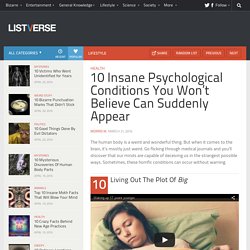
But when it comes to the brain, it’s mostly just weird. Go flicking through medical journals and you’ll discover that our minds are capable of deceiving us in the strangest possible ways. Sometimes, these horrific conditions can occur without warning. 10 Living Out The Plot Of Big Remember that Tom Hanks film Big? If you’ve ever stopped to think about the plot, you’ve probably realized that Big is kind of terrifying. At the time, Jacobs was 32 and dealing with the fallout from a decade of homelessness, bankruptcy, and drug abuse. The last thing that she could recall happened when she was 15.
From Naomi’s point of view, she’d fallen asleep as a teenager and awakened as an adult. Interestingly, there was no physical reason for Jacobs to lose her memory. 9 Seeing An Extra Dimension. How to Tell a Sociopath from a Psychopath. What Is a Psychopath? Scientific explanation of psychopathy cuts jail time - science-in-society - 16 August 2012. Serial sex offender Raymond Henry Garland, considered one of Australia's most dangerous sexual predators, was officially diagnosed a psychopath last week.

Psychiatrist Joan Lawrence told the Brisbane District Court that Garland had an "almost 100 per cent chance of violent reoffending. "
Psychology A2: The Complete Companion - Mike Cardwell, Cara Flanagan. A Lesson About Happiness From A Holocaust Survivor. Shutterstock.

Addiction is not a disease: A neuroscientist argues that it’s time to change ... The mystery of addiction — what it is, what causes it and how to end it — threads through most of our lives.
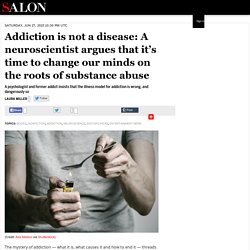
Experts estimate that one in 10 Americans is dependent on alcohol and other drugs, and if we concede that behaviors like gambling, overeating and playing video games can be addictive in similar ways, it’s likely that everyone has a relative or friend who’s hooked on some form of fun to a destructive degree. But what exactly is wrong with them? For several decades now, it’s been a commonplace to say that addicts have a disease. However, the very same scientists who once seemed to back up that claim have begun tearing it down. Are you to blame for your child's mental health issues? Milgram Experiment - The Heist. Philip Zimbardo: The psychology of evil. Are paedophiles' brains wired differently? There has been immense concern in recent years over the scale of child sexual abuse.

But even after years of study and investigation there's still disagreement over what causes paedophiles to be the way they are, writes Richard Sanders. "People, they think 'why should we help the paedophile? We should be prosecuting them, throwing them in jail, having them castrated'. But if we offer help to paedophiles we might save children who might have been abused. " New Brain Health. A-level Psychology Psychopathology Revision - Explanations of Schizophrenia. No single cause has been identified, biological, behavioural and social research suggests a complex interplay between factors.

For example, people might have an inherited tendency towards schizophrenia that is triggered by environmental circumstances. Family history studies show that schizophrenia tends to run in families. The rate of schizophrenia in the general population is about 1%, but estimates vary. Studies using twins show that in identical (monozygotic or MZ) twins, if one has schizophrenia, the other has 40-50% chance of developing the illness. Concordance rates for schizophrenia are three times higher in identical twins than non-identical twins (dizygotic or DZ). If one parent has schizophrenia then a child has about ten percent chance of developing it. The problem with families, including twins, is that they share the same environment. Genetic factors could be behind biochemical or neurological defects outlined below.
Evidence for the dopamine hypothesis:. What Is a Psychological Disorder? What exactly is a psychological disorder?
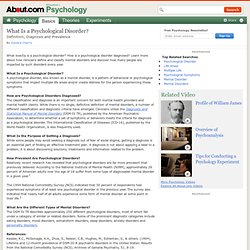
How is a psychological disorder diagnosed? Learn more about how clinicians define and classify mental disorders and discover how many people are impacted by such disorders every year. List of Psychological Disorders. Psychological disorders, also known as mental disorders, are patterns of behavioral or psychological symptoms that impact multiple areas of life.
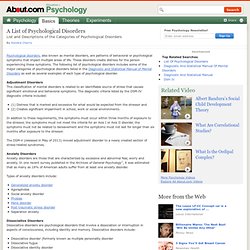
These disorders create distress for the person experiencing these symptoms. The following list of psychological disorders includes some of the major categories of psychological disorders listed in the Diagnostic and Statistical Manual of Mental Disorders as well as several examples of each type of psychological disorder. Adjustment Disorders. Personality Disorders. According to a study published in the Journal of Clinical Psychiatry, an estimated 30.8 million American adults experience symptoms of at least one personality disorder.
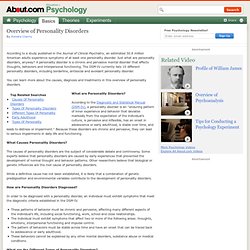
Just what are personality disorders, anyway? A personality disorder is a chronic and pervasive mental disorder that affects thoughts, behaviors and interpersonal functioning. The DSM-IV currently lists 10 different personality disorders, including borderline, antisocial and avoidant personality disorder. You can learn more about the causes, diagnosis and treatments in this overview of personality disorders. Cognitive Therapy Works As Well As Antidepressants, But With Lasting Effect After Therapy Ends. PHILADELPHIA -- Cognitive therapy to treat moderate to severe depression works just as well as antidepressants, according to an authoritative report appearing today in the Archives of General Psychiatry.
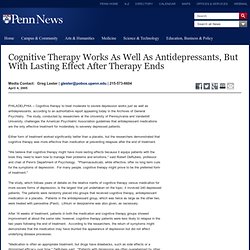
The study, conducted by researchers at the University of Pennsylvania and Vanderbilt University, challenges the American Psychiatric Association guidelines that antidepressant medications are the only effective treatment for moderately to severely depressed patients. Either form of treatment worked significantly better than a placebo, but the researchers demonstrated that cognitive therapy was more effective than medication at preventing relapses after the end of treatment.
The Science of Stress and How Our Emotions Affect Our Susceptibility to Burnout and Disease. By Maria Popova How your memories impact your immune system, why moving is one of the most stressful life-events, and what your parents have to do with your predisposition to PTSD. I had lived thirty good years before enduring my first food poisoning — odds quite fortunate in the grand scheme of things, but miserably unfortunate in the immediate experience of it. I found myself completely incapacitated to erect the pillars of my daily life — too cognitively foggy to read and write, too physically weak to work out or even meditate. The temporary disability soon elevated the assault on my mind and body to a new height of anguish: an intense experience of stress. Even as I consoled myself with Nabokov’s exceptionally florid account of food poisoning, I couldn’t shake the overwhelming malaise that had engulfed me — somehow, a physical illness had completely colored my psychoemotional reality.
How to Boost Serotonin: 10 Steps. Edit Article Edited by IsabelleZita, Flickety, IngeborgK, Teresa and 11 others. How to increase serotonin in the human brain without drugs. What is serotonin? What does serotonin do? Serotonin (5-hydroxytryptamine, 5-HT) is a chemical found in the human body. It carries signals along and between nerves - a neurotransmitter. It is mainly found in the brain, bowels and blood platelets. Serotonin is thought to be especially active in constricting smooth muscles, transmitting impulses between nerve cells, regulating cyclic body processes and contributing to wellbeing and happiness.1 Serotonin is regarded by some researchers as a chemical that is responsible for maintaining mood balance, and that a deficit of serotonin leads to depression. The word serotonin comes from its discovery when it was isolated in 1948 by Maurice M. This Medical News Today article provides essential information on serotonin.
You will also see introductions at the end of some sections to any recent developments that have been covered by MNT's news stories. Fast facts on serotonin Here are some key points about serotonin. Seratonin molecule. Animal cognition. Animal cognition is the study of the mental capacities of animals. It has developed out of comparative psychology, including the study of animal conditioning and learning, but has also been strongly influenced by research in ethology, behavioral ecology, and evolutionary psychology. The alternative name cognitive ethology is therefore sometimes used; much of what used to be considered under the title of animal intelligence is now thought of under this heading.[1] Research has examined animal cognition in mammals (especially primates, cetaceans, elephants, dogs, cats, horses,[2][3] raccoons and rodents), birds (including parrots, corvids and pigeons), reptiles (lizards and snakes), fish and invertebrates (including cephalopods, spiders and insects).[1] Historical background[edit] Animal cognition from anecdote to laboratory[edit] The behavioristic half-century[edit]
Animal cognition. Top 10 Common Faults In Human Thought. Humans The human mind is a wonderful thing. Cognition, the act or process of thinking, enables us to process vast amounts of information quickly. For example, every time your eyes are open, you brain is constantly being bombarded with stimuli.